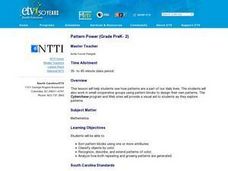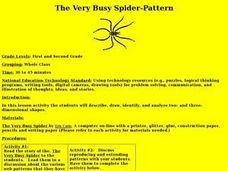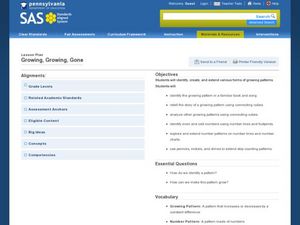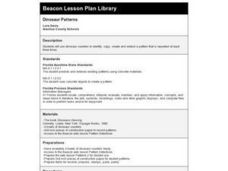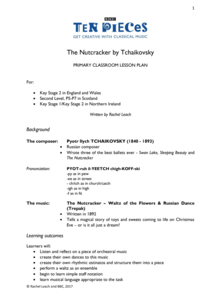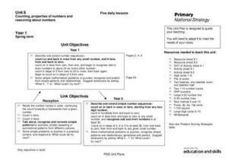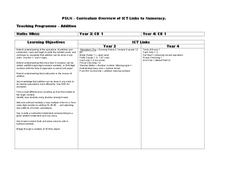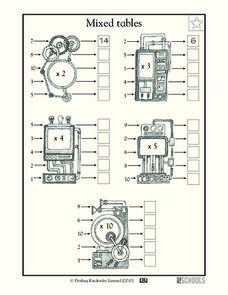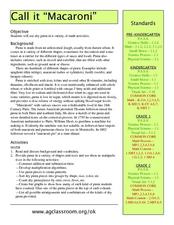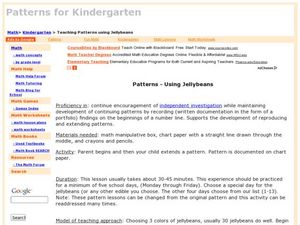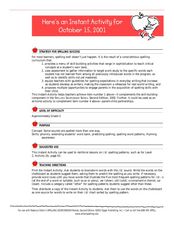Curated OER
Pattern Power
Young elementary students will discover there are patterns all around them in their daily lives. In groups, they sort pattern blocks by size and color. Using the internet, they create their own type of patterns and share them with the...
Mississippi State University
The Five Senses
Your learners engage their five senses every day without knowing it. Help them identify their experiences and extend their understanding with a month full of lessons designed for the five senses. Kids focus on a different sense every...
Curated OER
Three Little Kittens: Addition Booklet
Students explore math problem solving strategies while reading a nursery rhyme. In this addition instructional activity, students learn math skills such as solving simple equations, graphing data and extending patterns while reading The...
National Gallery of Canada
Build a Neighbourhood
What's special about your neighborhood? Build one with your class to find out. Individuals create their dream homes that, when completed, will be placed together around a green space in order to create a neighborhood. Learners also...
Pennsylvania Department of Education
Extending Pattern Understandings
Learners use shapes and manipulatives to demonstrate patterns. In this patterns lesson plan, students also break up patterns to identify a pattern unit.
Curated OER
The Very Busy Spider-Pattern
Students explore two- and three-dimensional shapes. In this very busy spider lesson, students read the story and then create a spider web pattern of their own. The webs must use a symmetrical pattern. Additional activities...
Curated OER
Growing, Growing, Gone
Budding mathematicians identify growing patterns in numbers and songs then create their own patterns. They look at number patterns and language patterns and then create their own using money and footprints.
Curated OER
Patterns
Second graders work with different types of patterns. In this pattern lesson, 2nd graders go to a pattern block webpage and use Unifix cubes to create their own patterns. They find patterns in the real world and draw their own...
Curated OER
Dinosaur Patterns
Students listen to story Dinosaurs Dancing, use dinosaur counters to identify, copy, create and extend pattern that is repeated at least three times, and complete web lesson plan.
Curated OER
Repeating Patterns
Pupils explore growth patterns by using manipulatives such as pattern blocks, investigate growth pattern of pattern, record growth in T-chart, describe how pattern is growing, and predict number of blocks needed to extend pattern.
Curated OER
It Just Keeps Going and Going...
Students explore patterns, identify patterns, and complete a variety of patterns. They view and discuss an online video and identify the different patterns from the film, then using a hundreds grid create an original pattern using their...
BBC
The Nutcracker by Tchaikovsky
Over the course of six lessons, scholars try their hand at composing and dancing after a thorough examination of the famous ballet, The Nutcracker, by Tchaikovsky. Participants watch and discuss the performance of two dances, create...
Curated OER
Counting, Properties of Numbers, and Reasoning about Numbers
Five days of lessons develop number sense and counting patterns, including odd and even numbers, 5s and 10s, doubles, and ways to make 10. Each session opens with fun finger play to reinforce counting and reasoning about numbers. Various...
Curated OER
Curriculum Links To Numeracy
Youngsters practice looking for the links to numeracy in their classes. This isn't a worksheet but a curriculum guide for an entire unit. Teachers can use any part of the resource to extend or inform their teaching practices related to...
Curated OER
Mixed Tables
Who knows how to operate these multiplication machines? Young mathematicians examine five machines, each with a specific function (i.e. x3) to transform the input numbers to output numbers. They send five numbers through each machine,...
Curated OER
Call it "Macaroni"
Who knew there were so many fun educational opportunities featuring pasta? Scholars read a brief informational text about the history of pasta (note that "macaroni" is spelled two different ways, so address this if kids are reading...
Curated OER
Counting Forward or Back
What comes next? Young counters follow the stone path to each house, filling in numbers in a sequence as they go. Some of these move forward and some backward, but all progress by ones. Learners start with given numbers and then follow...
Curated OER
Pattern Makers
Students are introduced to the notion of a repeating pattern. This is done by a number of means including the use of everyday objects. They are encouraged to create, describe and continue patterns.
Curated OER
Extending Geometric and Numeric Patterns
Learners study patterns. They construct growing patterns using pattern blocks and isosceles right triangles. They verbally describe the patterns and state the rule that describes the relationship involving the number of pattern blocks...
Curated OER
Pattern Detectives
Pupils discover patterns in language, math and science. They experience patterns by hearing stories, and becoming pattern detectives.
Curated OER
Using Jellybeans
Students extend patterns that are created by their teacher by using jellybeans. In this patterns lesson plan, students use 3 different colored jellybeans.
Curated OER
Phonics: Long O Spelling Patterns
Second graders review the spelling of words with the long O sound. In this phonics activity, 2nd graders brainstorm words with the long O sound, gain exposure to common long O spelling patterns and sort long O words based upon the...
Curated OER
Patterns
Second graders create an ABAB pattern with their name. In this early elementary math lesson, 2nd graders first model their names in an ABAB pattern with unifix cubes. They then recreate the pattern using letter stamps on KidPix.
Curated OER
Shape Patterns
In this math worksheet, students examine a pattern of geometric shapes. After looking at the sequence of shapes and deciding what the pattern is, students choose the shape that would come next. There are 4 problems.
